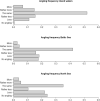Global responses to the COVID-19 pandemic by recreational anglers: considerations for developing more resilient and sustainable fisheries
- PMID: 37360579
- PMCID: PMC10227408
- DOI: 10.1007/s11160-023-09784-5
Global responses to the COVID-19 pandemic by recreational anglers: considerations for developing more resilient and sustainable fisheries
Abstract
The global COVID-19 pandemic resulted in many jurisdictions implementing orders restricting the movements of people to inhibit virus transmission, with recreational angling often either not permitted or access to fisheries and/or related infrastructure being prevented. Following the lifting of restrictions, initial angler surveys and licence sales suggested increased participation and effort, and altered angler demographics, but with evidence remaining limited. Here, we overcome this evidence gap by identifying temporal changes in angling interest, licence sales, and angling effort in world regions by comparing data in the 'pre-pandemic' (up to and including 2019); 'acute pandemic' (2020) and 'COVID-acclimated' (2021) periods. We then identified how changes can inform the development of more resilient and sustainable recreational fisheries. Interest in angling (measured here as angling-related internet search term volumes) increased substantially in all regions during 2020. Patterns in licence sales revealed marked increases in some countries during 2020 but not in others. Where licence sales increased, this was rarely sustained in 2021; where there were declines, these related to fewer tourist anglers due to movement restrictions. Data from most countries indicated a younger demographic of people who participated in angling in 2020, including in urban areas, but this was not sustained in 2021. These short-lived changes in recreational angling indicate efforts to retain younger anglers could increase overall participation levels, where efforts can target education in appropriate angling practices and create more urban angling opportunities. These efforts would then provide recreational fisheries with greater resilience to cope with future global crises, including facilitating the ability of people to access angling opportunities during periods of high societal stress.
Supplementary information: The online version contains supplementary material available at 10.1007/s11160-023-09784-5.
Keywords: Angler demographics; Angling effort; Angling licence; COVID-19 lockdown; Culturomics.
© The Author(s) 2023.
Conflict of interest statement
Conflict of interestThe authors declare no conflict of interest.
Figures




References
-
- Aas Ø, Cucherousset J, Fleming IA, et al. Salmonid stocking in five North Atlantic jurisdictions: identifying drivers and barriers to policy change. Aquat Conserv. 2018;28:1451–1464. doi: 10.1002/aqc.2984. - DOI
-
- Allen T, Olds E, Southwick R et al. (2018) Sportfishing in America: an economic force for conservation. American Sportfishing Association via Multistate Grant #F17AP00082 awarded by the Wildlife and Sport Fish Restoration Programs of the U.S. Fish and Wildlife Service
-
- Armstrong M, Brown A, Hargreaves J et al (2013) Sea Angling 2012 - a survey of recreational sea angling activity and economic value in England. Department for Environment Food and Rural Affairs, UK, 16 pp
-
- Arlinghaus R, Cooke SJ. Recreational fisheries: Socioeconomic importance, conservation issues and management challenges. In: Dickson B, Hutton J, Adams WM, editors. Recreational hunting, conservation and rural livelihoods: science and practice. Hoboken: Blackwell Publishing Ltd; 2009. pp. 39–58.
-
- Arlinghaus R. Understanding recreational angling participation in Germany: preparing for demographic change. Human Dimen Wild. 2006;11:229–240. doi: 10.1080/10871200600802889. - DOI
Publication types
LinkOut - more resources
Full Text Sources
Miscellaneous
